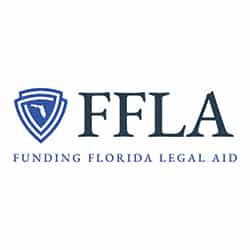
Foundation President Emerson R. Thompson Jr. addressed the media at a Nov. 24 press conference announcing the establishment of the Florida Commission on Access to Civil Justice.
The Florida Bar Foundation’s mission of providing greater access to justice is now the goal of a commission created last fall by administrative order of Florida Chief Justice Jorge Labarga and funded by The Florida Bar.
The 27-member Florida Commission on Access to Civil Justice is studying the unmet civil legal needs of disadvantaged, low-income, and moderate-income Floridians and will recommend ways to address them systemically.
“In establishing and funding this commission, Chief Justice Labarga and Florida Bar President Greg Coleman have demonstrated their commitment to the Foundation’s fundamental purpose,” said Florida Bar Foundation President Emerson R. Thompson Jr., a member of the commission and a senior judge on the Fifth District Court of Appeal. “We really couldn’t ask for much more than that.”
The Foundation is one of the primary partners behind the commission, working alongside The Florida Bar, the Florida Supreme Court and the Office of the State Courts Administrator.
Foundation President-elect Donny MacKenzie, a commission member, believes the outcomes will protect the rule of law in Florida, as well as the state’s people and economy.
“By acknowledging that the need for meaningful and reasonable access to justice is a societal issue, we can make systemic, non-partisan and well-informed change for everyone’s benefit,” MacKenzie said.
MacKenzie serves on the commission’s Access to and Delivery of Legal Services subcommittee, which is chaired by William A. Van Nortwick Jr., a past president of the Foundation and past chair of the Florida Bar Standing Committee on Pro Bono Legal Services.
Van Nortwick said the subcommittee will look at traditional and nontraditional approaches to increasing access.
“While my crystal ball doesn’t show me what changes in the justice system will be made as a result the commission’s proposals, I am confident we will see greater use of technology; more court simplification and procedures to assist self-represented litigants; the use of institutions outside the courthouse, such as public libraries, in delivering legal assistance; and more effective use of pro bono and legal aid attorneys to represent parties with the most serious legal problems,” Van Nortwick said.
Commission member Kathy McLeroy, also a past Foundation president, can draw on her experience as co-chair of the Bar’s pro bono committee and a member of the Bar’s Vision 2016 committee.
“We have on the access subcommittee a cadre of current and past Florida Bar Foundation leaders who are steeped in the issues and determined to effect change,” Thompson said.
Serving along with them is Jim Kowalski, executive director of Jacksonville Area Legal Aid, one of the Foundation’s 30 legal aid grantees. At the commission’s first meeting Jan. 16, Kowalski acknowledged that change can be daunting, but he expressed optimism.
“If there’s anything I’ve learned from participating with the members of this panel, it’s that this is a huge opportunity, and certainly among this group there is a huge desire to assist in that change,” he said.
Thompson is chairing the funding subcommittee, which will look at a wide range of possibilities for increasing financial support for civil legal aid from private and public sources.
Other subcommittees will focus on technology, outreach, and the continuum of legal services. Each has staff support from the Bar, the Court and the Foundation.
The commission is charged with submitting an interim report to the Court no later than Oct. 1, and a final report and recommendations no later than June 30, 2016. The administrative order requires that in its final report the commission “should include recommendations on the need for the establishment of a permanent access to justice commission in Florida.”
As in other states, some of which have access to justice commissions dating back to the 1990s, Florida’s commission is envisioned as a permanent body that will continually work to improve the system based on its own studies and recommendations, as well as innovations that have proven successful elsewhere.
“A two-year term is not the end of the commission,” Labarga said in a Jan. 30 interview with The Florida Channel. “What I envision is for this commission to be in place for a long time to keep studying ways to do this better and to include as many people as possible.”


